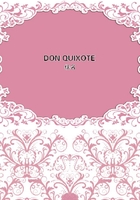
第382章
TERESA PANZA'S LETTER TO HER HUSBAND SANCHO PANZA.
I got thy letter, Sancho of my soul, and I promise thee and swear as a Catholic Christian that I was within two fingers' breadth of going mad I was so happy. I can tell thee, brother, when I came to hear that thou wert a governor I thought I should have dropped dead with pure joy; and thou knowest they say sudden joy kills as well as great sorrow; and as for Sanchica thy daughter, she leaked from sheer happiness. I had before me the suit thou didst send me, and the coral beads my lady the duchess sent me round my neck, and the letters in my hands, and there was the bearer of them standing by, and in spite of all this I verily believed and thought that what I saw and handled was all a dream; for who could have thought that a goatherd would come to be a governor of islands? Thou knowest, my friend, what my mother used to say, that one must live long to see much; I say it because I expect to see more if I live longer; for I don't expect to stop until I see thee a farmer of taxes or a collector of revenue, which are offices where, though the devil carries off those who make a bad use of them, still they make and handle money. My lady the duchess will tell thee the desire I have to go to the Court; consider the matter and let me know thy pleasure; I will try to do honour to thee by going in a coach.
Neither the curate, nor the barber, nor the bachelor, nor even the sacristan, can believe that thou art a governor, and they say the whole thing is a delusion or an enchantment affair, like everything belonging to thy master Don Quixote; and Samson says he must go in search of thee and drive the government out of thy head and the madness out of Don Quixote's skull; I only laugh, and look at my string of beads, and plan out the dress I am going to make for our daughter out of thy suit. I sent some acorns to my lady the duchess; I wish they had been gold. Send me some strings of pearls if they are in fashion in that island. Here is the news of the village; La Berrueca has married her daughter to a good-for-nothing painter, who came here to paint anything that might turn up. The council gave him an order to paint his Majesty's arms over the door of the town-hall; he asked two ducats, which they paid him in advance; he worked for eight days, and at the end of them had nothing painted, and then said he had no turn for painting such trifling things; he returned the money, and for all that has married on the pretence of being a good workman; to be sure he has now laid aside his paint-brush and taken a spade in hand, and goes to the field like a gentleman. Pedro Lobo's son has received the first orders and tonsure, with the intention of becoming a priest. Minguilla, Mingo Silvato's granddaughter, found it out, and has gone to law with him on the score of having given her promise of marriage. Evil tongues say she is with child by him, but he denies it stoutly. There are no olives this year, and there is not a drop of vinegar to be had in the whole village. A company of soldiers passed through here; when they left they took away with them three of the girls of the village; I will not tell thee who they are; perhaps they will come back, and they will be sure to find those who will take them for wives with all their blemishes, good or bad. Sanchica is making bonelace; she earns eight maravedis a day clear, which she puts into a moneybox as a help towards house furnishing; but now that she is a governor's daughter thou wilt give her a portion without her working for it. The fountain in the plaza has run dry. A flash of lightning struck the gibbet, and I wish they all lit there. I look for an answer to this, and to know thy mind about my going to the Court; and so, God keep thee longer than me, or as long, for I would not leave thee in this world without me.
Thy wife, TERESA PANZA.
The letters were applauded, laughed over, relished, and admired; and then, as if to put the seal to the business, the courier arrived, bringing the one Sancho sent to Don Quixote, and this, too, was read out, and it raised some doubts as to the governor's simplicity. The duchess withdrew to hear from the page about his adventures in Sancho's village, which he narrated at full length without leaving a single circumstance unmentioned. He gave her the acorns, and also a cheese which Teresa had given him as being particularly good and superior to those of Tronchon. The duchess received it with greatest delight, in which we will leave her, to describe the end of the government of the great Sancho Panza, flower and mirror of all governors of islands.